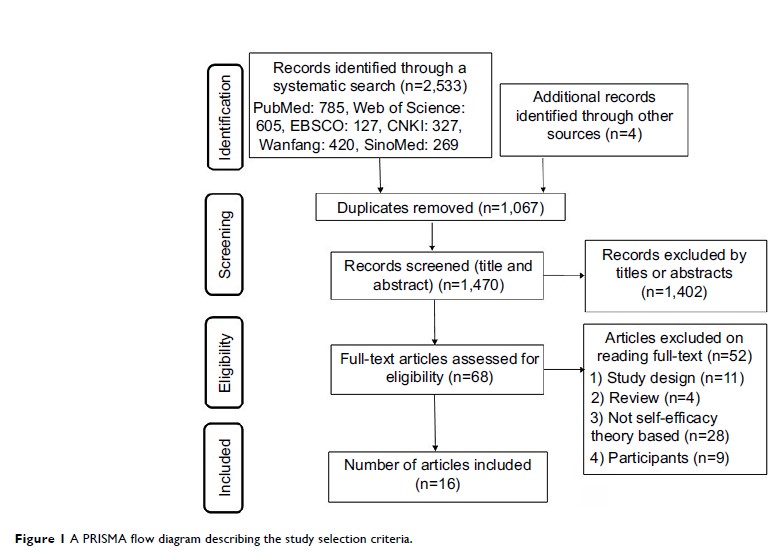108605
论文已发表
注册即可获取德孚的最新动态
IF 收录期刊
- 3.4 Breast Cancer (Dove Med Press)
- 3.2 Clin Epidemiol
- 2.6 Cancer Manag Res
- 2.9 Infect Drug Resist
- 3.7 Clin Interv Aging
- 5.1 Drug Des Dev Ther
- 3.1 Int J Chronic Obstr
- 6.6 Int J Nanomed
- 2.6 Int J Women's Health
- 2.9 Neuropsych Dis Treat
- 2.8 OncoTargets Ther
- 2.0 Patient Prefer Adher
- 2.2 Ther Clin Risk Manag
- 2.5 J Pain Res
- 3.0 Diabet Metab Synd Ob
- 3.2 Psychol Res Behav Ma
- 3.4 Nat Sci Sleep
- 1.8 Pharmgenomics Pers Med
- 2.0 Risk Manag Healthc Policy
- 4.1 J Inflamm Res
- 2.0 Int J Gen Med
- 3.4 J Hepatocell Carcinoma
- 3.0 J Asthma Allergy
- 2.2 Clin Cosmet Investig Dermatol
- 2.4 J Multidiscip Healthc

糖尿病患者的自我效能感教育:系统评价和荟萃分析
Authors Jiang X, Wang J, Lu Y, Jiang H, Li M
Received 29 October 2018
Accepted for publication 7 December 2018
Published 29 January 2019 Volume 2019:12 Pages 67—79
DOI https://doi.org/10.2147/PRBM.S192571
Checked for plagiarism Yes
Review by Single-blind
Peer reviewers approved by Dr Andrew Yee
Peer reviewer comments 2
Editor who approved publication: Professor Mei-chun Cheung
Aims: The aims of this study were to assess the
effectiveness of self-efficacy-focused education on health outcomes in persons
with diabetes and review the strategies employed in the interventions.
Background: The
traditional educational interventions for persons with diabetes were
insufficient to achieve the desired outcomes. Self-efficacy-focused education
has been used to regulate the blood sugar level, behaviors, and psychosocial
indicators for persons with diabetes.
Design: This
study is a systematic review and meta-analysis.
Methods: Studies
on the effectiveness of self-efficacy-focused education in persons with
diabetes were searched in six databases from inception until January 2018. The
data were extracted and the quality of literature was assessed independently.
Review Manager 5.3 was applied for the meta-analysis. Besides, the findings
were summarized for narrative synthesis.
Results: Sixteen
trials with 1,745 participants were included in the systematic review and ten
trails with 1,308 participants in the meta-analysis. The meta-analysis for A1C,
self-efficacy, self-management behaviors, knowledge, and quality of life (QOL)
were represented in four, six, six, three, and three studies, respectively. The
findings indicated that self-efficacy-focused education would probably reduce
A1C, enhance self-efficacy, regulate self-management behaviors, increase
knowledge, and improve the QOL for patients with diabetes. Weak quality
studies, limited participants, and heterogeneity hindered the results pooled of
the other secondary outcomes of fasting blood glucose, 2-hour plasma glucose,
weight, weight circumference, body mass index, plasma lipid profile, and other
psychological indicators. Goal setting, self-management skills practicing and
recording, peer models, demonstration, persuasion by health providers, and
positive feedback were the most commonly used strategies in the interventions.
However, physiological/emotion arousal strategies were relatively less applied
and varied significantly.
Conclusion: Individuals
with diabetes may benefit a lot from the self-efficacy-focused education.
However, insufficient high-quality studies, short-term follow-up period,
relatively deficient physiological/emotion strategies, and incomplete outcome
assessments were the drawbacks in most studies. Establishing satisfactory
self-efficacy-focused education and better evaluating the effects were required
in further studies.
Keywords: self-efficacy,
self-management behavior, diabetes mellitus, diabetes education, review
